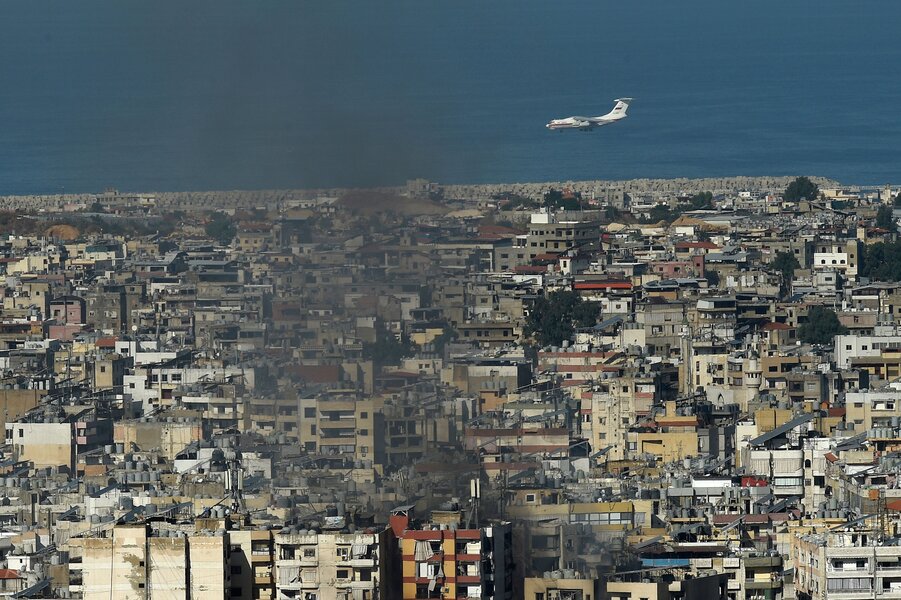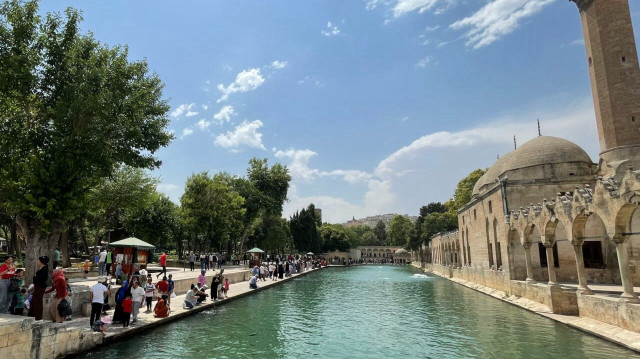Here’s What It’s Like for an American Trying to Leave Beirut Right Now

On September 17 and 18, thousands of pagers were detonated with explosives in Lebanon. The attack was carried out by the Israeli government, according to multiple official sources. While it has been claimed that the attack was meant to target members of Hezbollah, the explosions injured and killed hundreds of civilians, including children. Israel followed this attack with airstrikes and, on October 1, a ground invasion. Currently, at least one million people in Lebanon are internally displaced, according to the UN.
Israel has dropped bombs on civilian neighborhoods, including in the capital, Beirut. Home to 2.5 million people, Beirut also has a large community of Americans. In 2022, it was estimated that as many as 86,000 Americans live in the Lebanese city. Back in June of this year, the US government began making public plans for possible evacuations of US citizens. US officials expressed fears that Israel would begin airstrikes and even a ground invasion in the coming months. But when those fears were realized and airstrikes began, Americans living in Lebanon were not given very reassuring guidance by the US Embassy.
“The US Embassy is not evacuating US citizens at this time,” the official account for the agency tweeted on September 27. “There is a commercially available flight that U.S. citizens who expressed interest in departing Lebanon will have to book and pay directly with the airline.”
The announcement was heavily criticized. People began to share how much money it would cost them to book one-way flights out of the country on such short notice. Flying to New York from Beirut on October 4 would cost $13,256, according to Google Flights. A one-way flight booked at the last minute typically costs around $900. Even for those who could afford the cost, there were no guarantees, as flights were canceled repeatedly.
People immediately compared the US response in Lebanon to the State Department’s swift action on behalf of Americans who wanted to leave Israel following October 7. In that case, citizens were immediately transported out of Israel on chartered flights and ships. In a statement to Thrillist, the US State Department referred to Spokesperson Matthew Miller’s comments made available via Youtube which addressed the US response, including a single flight that transported 100 Americans out of Lebanon on October 2.
“We are concerned about the effects on American citizens, thousands of whom live in Lebanon, concerned about the effects on innocents who are now caught in the middle of a conflict they had nothing to do with,” Miller said during an October 3 press briefing.
Amy Fallas, 35, has not seen much evidence of that concern. Speaking on the phone with Thrillist, she described her experience trying to find a way out of Beirut after spending the last year living in the city while working on her PhD in modern Middle East history. She shared what it has been like to try and plan to leave Beirut and the people she loves.
Thrillist: Why did you move to Lebanon?
Amy Fallas: I’ve been living in Beirut since August of 2023. I moved here from Cairo where I was living for two years beforehand. So I’ve been in the region, I’m a PhD student, and I study modern Middle East history. I am spending my time now doing research, finishing my dissertation. The reason I came to Lebanon is because my partner is Lebanese, and there’s a great academic community here, and actually a very rich expat community as well. I thought that it really made a lot of sense to relocate.
When did you realize that the situation in Lebanon was getting dangerous, and what were your first thoughts?
AF: Basically the first couple days after October 7, everyone in Lebanon was on high alert that the conflict could spread, that we might be in direct danger. A lot of us decided to stay, even though a lot of embassies were cautioning their citizens to not travel or to leave if they were there. It was around that time that I started to actually enlist with the US embassy and with the State Department, letting them know I’m here, what my movements were in the case that there would be emergency notifications. There were, but they were all pretty much the same: “Get out while there’s commercial flights available.”
This went on for months and months and months. Of course there has been fighting, there has been conflict. It has been mostly concentrated in the south of the country. A lot of us felt that while perhaps we should leave, a lot of us had many different reasons to stay. Me, the person I love is here and his family is from the south. If he felt safe being in Beirut and didn’t caution me or push me to leave, I was going to stay.
I think that radically changed two weeks ago. I will say there was a lot of tension over the summer. A lot of my friends here, every single week, it was kind of like a buddy system of how are you feeling? Do you think things are escalating? Because there were Israeli warships that were breaking the sound barrier. It felt like there was a bombing even if there wasn’t. I have been evacuated before from the Middle East, so I kind of have some familiarity of what that would look like.
It was really about two-and-a-half weeks ago when the pager attack happened that I said, okay, that’s a real escalation. It just has been a free fall since then. It was that day that I started looking for flights, booking flights, and they started to get canceled. We’re still not hearing anything from the embassy to this day. There is no actual evacuation plan that is a formal evacuation operation that’s run by the State Department as has been the case in the past.
Could you talk to me a little bit more about what kind of prices you were seeing when you were looking at these flights to get out?
AF: I actually was simply looking for flights to Cairo. A one-hour flight to regional and major international airports. I booked a flight, which was not cheap, but I think it was about $400. The problem was you would see that price, you would book it, and then either the next day they would say it was canceled or overbooked.
In terms of price ranges, I started to see things for Cairo—it’s a one-hour flight that’s normally under $200 one way—it was around the $1,500 range, which is still prohibitive, especially since I’m a graduate student. I don’t really have savings, my family are immigrants, I don’t have resources. And of course the [US] government said, oh, purchase the flight. If you need a loan, we will give it to you and you can pay us back. And even that, I don’t think that that’s what a government is required to do. They’re required to really care about the welfare of their citizens.
Do you have any peers or colleagues who are from other countries or have citizenships in other countries where the response has been different than the US?
AF: The Portuguese I know had a chartered flight. If it wasn’t earlier this week, late last weekend, I had a friend take his family on that chartered flight. I have friends who were contacted by the Belgian embassy and saying, we are also making preparations if you could please give us your information. The US has continued to push the commercial options instead. It’s interesting because they’ve said that they had been preparing even over the summer, and all they have done is send periodic emails of whether they have any updates. And the latest update has just been to sign a crisis intake form in case any evacuation becomes available.
On an emotional level, are you feeling anger or frustration? I imagine it would be hard to navigate the human gut responses while you’re balancing the survival instincts of “I need to have the best information I can to know my best options for safety.”
AF: I think the emotional component is so crucial because when you’re in situations like this, and I haven’t been in this exact situation, but I was evacuated from Egypt during the Arab Spring, and it is in that moment you were thinking, okay, I have to look through the data and the logistics to put myself in the most safe situation. And sometimes that isn’t leaving. So for instance, right now, my biggest concern is all of the roads to the airport are in areas that are being bombarded. So even if I’m in an area of Beirut that has not been directly targeted, and by that I mean last night there was a bomb that went off a mile down the road, there’s still those logistics that I had to think about. How am I going to get from here to there? Will I have everything necessary?
My partner’s going to stay in my place, and I want to make sure that he has everything that he needs and that he has options.I really want to put my friends and family at ease, and that’s why I am leaving. I think it is the right choice to make because it’s so unpredictable. The bombs are getting closer and closer to where I am and I am scared. But then also I have people that I love here.
It is also tremendously horrible to be in this situation knowing that my tax dollars are going into creating this environment where I have to leave my partner behind. It is a horrible, horrible situation to be in. There’s a lot of emotions that I’m wrestling with that I think has been anger and now is kind of turning to sadness as I realized that I did find a flight. I’ve been waiting on this flight for 11 days, and my parents have been calling me every day and everyone’s been checking in.
We’ve been holding our breath, but then also holding our breath to what? There were medical workers that were killed last night and there were children in these residential areas in the suburbs that have been killed over the past week.
Do you plan on returning to Beirut? Do you have any timelines? Or is that something that will be developed as you go?
AF: Right now I have all of the infrastructure that I’m leaving right here with my friends and loved ones. And even my apartment I plan on returning at this point. I don’t know when that will be. I think that that is one of the most horrifying realities because I’ve seen things escalate every day where I just didn’t realize that it would get to that level.
We don’t know at what point things will be safe. I personally plan to be in the region simply because my research is based here, and I’m trying to finish a PhD, which is just, it’s a crazy time to finish a PhD in Middle East history and be here. I will be basically in the region and reevaluating every month. I don’t really see a quick resolution to this without a stronger US position, because there’s really no restraints for Israel.
Nothing seems to be off limits. And so until I have a little bit more assurance that things can go back to—not even the normal way of life, I mean, so many people have been displaced and their homes are destroyed. It’s not going to go back to the Beirut that I knew three weeks ago or a year ago.
Related
State Department issues urgent travel warning after death of American…
The State Department has issued an urgent warning to Americans travelling to Laos after a citizen died from drinking tainted alcohol. The unidentified American
‘Gate lice’ crackdown expanded to target pushy passengers
Sign up to Simon Calder’s free travel email for expert advice and money-saving discountsGet Simon Calder’s Travel emailGet Simon Calder’s Travel emailAmer
American Airlines expands crackdown on frustrating travel habit to more…
By LAUREN ACTON-TAYLOR FOR DAILYMAIL.COM Published: 06:04 GMT, 22 November 2024 | Updated: 06:05 GMT, 22 November 2024
Travel writers explore Türkiye’s Sanliurfa, its ancient history | News
A group of travel writers visited Sanliurfa with the support of the Turkish Ministry of Culture and Tourism following the American Travel Writers Association's










